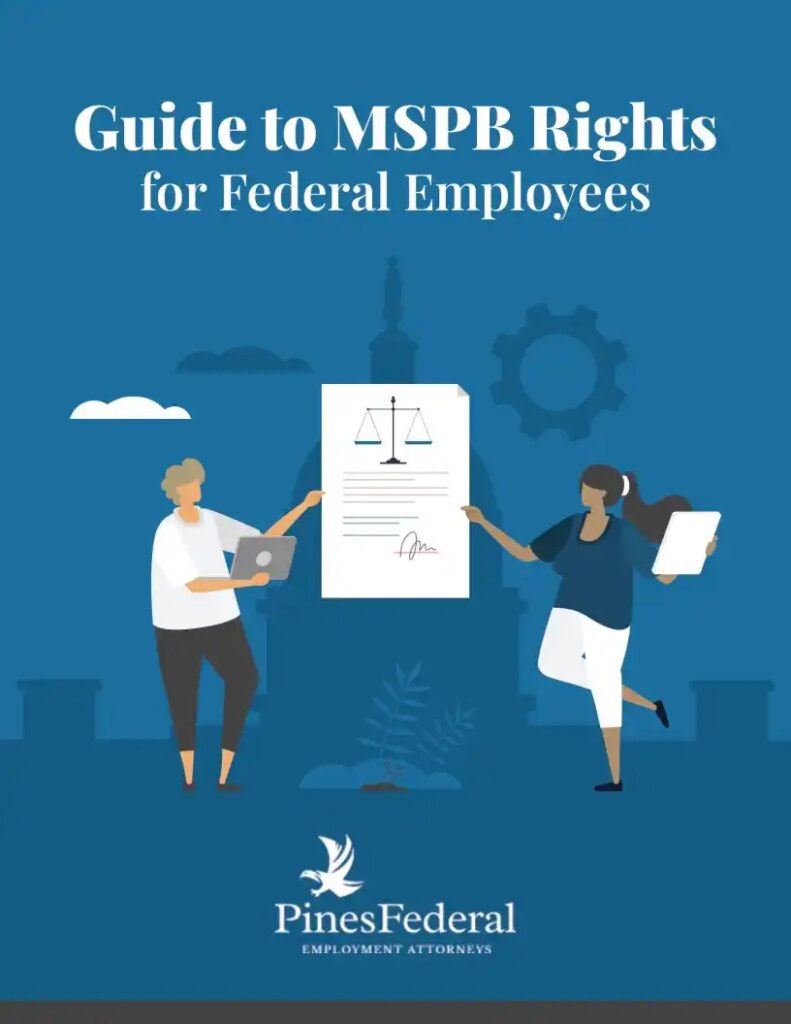Unlike private sector employees, virtually all federal employees have the right to appeal adverse actions taken against them.

If you want to appeal an adverse action – such as a removal/termination, demotion, suspension longer than 14 days denial of Within-Grade Increases (WIGI) – then you may need to file a Merit Systems Protection Board appeal (MSPB) to challenge the action.
The MSPB is a unique government agency that not only hears and decides your case, it can also reverse your agency’s action and grant you various forms of relief, including job reinstatement, back pay, removal of the offending action from your personnel file (i.e. cleaning your record), reimbursement of attorney’s fees, and, in many cases, especially where an EEO, Whistleblower, or other type of claims are involved, compensatory damages and/or consequential damages.
Read on to learn more about the basics of MSPB appeals and how you can file one today. We will also discuss how to win an MSPB appeal. If you are considering filing an MSPB appeal or facing discipline, you should contact a qualified MSPB attorney immediately.
The deadline for filing an appeal with the MSPB is generally 30 calendar days from the date of the action; however, certain grievable offenses may need to be filed sooner and cases with VA employees, for example, may be subject to a 10 business-day deadline for filing.
Give us a call at (800) 801-0598 or send an online message today.
First Things First: Who Can File Merit Systems Protection Board Appeals?
The MSPB is an independent federal agency designed to “promote an effective Federal workforce” free from discrimination, nepotism, and various kinds of corruption. The MSPB executes this goal by hearing appeals brought by federal employees who have had an adverse action taken against them.
Appeals include the following actions against federal employees:
- Removals,
- Suspensions of more than 14 days,
- Demotions,
- Furloughs of less than 30 days,
- Performance-based removals, and
- Denials of within-grade salary increases.
Probationary federal employees can bring MSPB appeals as well, but only for limited reasons. Most hearings are heard by an administrative judge (AJ). However, certain cases and appeals may be brought before the Board itself, which features three judicial officers.
[DOWNLOAD] MSPB Rights for Federal Employees

When and How Do I File an MSPB Appeal?
You have only a limited time to file an MSPB appeal. Specifically, you need to file an appeal within 30 calendar days of the effective date of the adverse action that you are appealing or within 30 calendar days after the date of the receipt of the agency’s decision (whatever is later). If the 30th day falls on a weekend or federal holiday, the filing day will be extended to the next business day.
If you miss this deadline in filing your appeal, it will probably be dismissed by the MSPB.
You may file an appeal in writing and online. To file in writing, you must submit a petition for review to the Clerk of the Board by fax or postal mail. You can also submit a petition for review in person at a local or regional MSPB field office. You can file online as well using MSPB’s e-Appeal website.


“I have never been involved in a court case before and was scared to make even the first phone call to seek legal counsel. I found Pines Federal after reviewing several offices…My case was settled to my satisfaction and I can’t recommend this practice enough…”
What Happens When I File My MSPB Appeal?
Once you file an Appeal, the MSPB will notify the agency about your claim and may demand some preliminary evidence from one or both of the parties. After that, the AJ generally holds a preliminary status conference with the parties. During the status conference, the parties and the AJ clarify the key issues of the appeal, establish important deadlines, and discuss settlement options.
After the discovery conference, the parties are given a period of time to carry out discovery. The discovery process is when each party asks the other for important information or factual admissions before the hearing. Discovery can also include depositions. This means that one party interviews another and requires them to provide sworn testimony regarding certain facts.
Once discovery ends, the parties hold a prehearing conference with the judge. At this conference, the AJ discusses several key matters with the parties, including general hearing procedures, each party’s witnesses and exhibits, and any stipulated facts. The AJ holds a hearing shortly after that time.
Featured Case Result
WHAT HAPPENED: A client went through an extremely complex and difficult constructive and involuntary removal action on an appeal at the Federal Circuit Court of Appeals. Our firm’s appeal at the Federal Circuit Court of Appeals revealed that this was an issue of first impression before the board.
3 Ways to Increase Your Chances of Winning Your MSPB Hearing
Certain actions taken before and during the MSPB hearing process can make all the difference between a successful appeal and the end of your federal career.
Three actions, in particular, can maximize your odds of winning your case:
- Save as much evidence as you can. As soon as you learn about a potential adverse action, collect any relevant information, documents, emails, etc.
- File your appeal promptly. Agency lawyers will look for any reason to have the AJ dismiss your appeal on technical grounds, so do not give them an opportunity by filing your appeal late.
- Contact a skilled MSPB lawyer immediately. A qualified MSPB lawyer can help you understand your rights, establish your odds of success, and apply the law to the specific facts in your case.
Our Team Has the Answers on How to Win an MSPB Appeal
Obtaining the right lawyer is the most important action you can take to save your federal career and win your appeal. Yet not all attorneys are equal. The best attorney is one with a track record of success and plenty of experience representing federal employees at MSPB hearings.
Our Pines Federal team has a lot of experience with MSPB appeals. Our attorneys have served clients across the nation for more than 20 years. During that time, we have obtained incredible results for our clients and have held many discriminatory agencies accountable. Call us today at (800) 801-0598 or contact us online to get started.